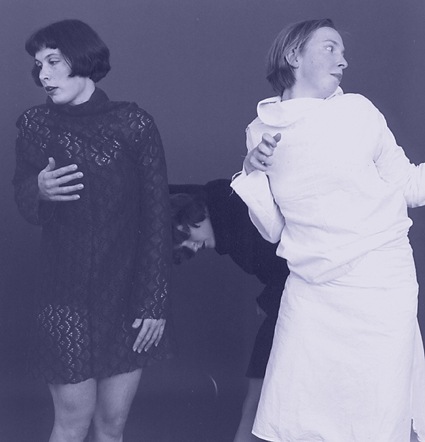A differential tale
Philipa Rothfield unearths Action Situation

Action Situation, Deanne Butterworth, Kylie Walters, Jo Lloyd
photo Kate Gollings
Action Situation, Deanne Butterworth, Kylie Walters, Jo Lloyd
Ideas are multiplicities: every idea is a multiplicity or a variety…multiplicity must not designate a combination of the many and the one, but rather an organisation belonging to the many as such, which has no need whatsoever of unity in order to form a system.
Gilles Deleuze, Repetition and Difference, Athlone Press, London
I cannot tell you what this piece is about. I can only write and in so doing produce another text: a re-iteration destined to become something other than the work itself. Action Situation foregrounds the fact that repetition becomes, inevitably, a moment of difference. Not only was there little replication between the 3 performing bodies, but the work itself highlighted the gap that lies between different, yet related, artforms.
Action Situation is an assemblage of music, script, movement, lighting and space. Each of these forms retained an integrity such that they did not blend into homogeneity. Not only was the music, for example, a distinct yet influential strain but the script also held its own character quite apart from the movement. In other words, Lasica does not choreograph to the ‘beat’ of the music, nor is her movement a mime of an underlying narrative. And yet, the differential participation of these elements did not lead to cacophony. There was a certain cohabitation between sound and movement. Similarly, there was a sense that some kind of narrative was manifest in the dance.
Were we archaeologists, we might be able to unearth the original script that instituted the narrative structure of the work. The ordinary viewer, however, is offered little by way of clues or references. No Rosetta stone is offered to translate from the hieroglyphs of moved interactions into some sense of the everyday. For example, there were times when one, sometimes 2, of the performers trod on the prone mass of the third. Was this a gesture of dominance, aggression, dependence or something else entirely? We will never know. Similarly, movements were performed under the watchful eye of one or other of the performers. There was a sense of bearing witness to an activity, that the performers shared a world, but what that world consists of is anybody’s guess. The only signification I can be certain of was when the 3 held hands during the curtain call. That gesture of naked camaraderie contrasted with the complex, interesting, detail of movement and interaction which comprised the substance. As far as movement is concerned, this is a very dense and satisfying work.
Although there were a variety of actions which could be interpreted as derived from some human strain of interaction, the work had an anti-humanist character, almost post-human. Rather than inhuman, it did not subscribe to any lyricism nor make reference to an instantly recognisable world. Although the audience has to work hard to take the work in (like looking at abstract painting), this is also its strength. Were there to be obvious references to ‘relationships’ or ‘communication’, the central premise would be lost, for Situation Live is about the abyss which lies between different modes. The music interacts with the movement; it does not mirror it. By the same token, narrative is not something to be illustrated by dance. Dance is able to form its own narrative, to be both inspired by the script, but not a servant to it.
Mimesis presupposes a sameness across forms. Action Situation is about difference. Even the language we use to speak of it becomes alien to the work itself. It cannot emulsify the disparate elements. Rather, the textuality of the written or spoken word can only add another layer to this already complex work.
Action Situation, directed and choreographed by Shelley Lasica, performers Deanne Butterworth, Jo Lloyd and Kylie Walters, music Francois Tetaz, script Robyn McKenzie, lighting design John Ford, costume design Kara Baker; Immigration Museum, Melbourne, February 12 – 20
RealTime issue #30 April-May 1999 pg. 32






